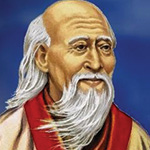Learning From Lao Tzu
When I took an online class from Papa Al last fall the class and I learned a lot of things. We learned about Lao Tzu started Taoism. Papa Al said that followers should go with the flow like when in the river. I found this picture of Lao Tzu.

Lao Tzu wrote that “When the student is ready, the teacher appears. When the student is truly ready, the teacher disappears.” That quote is something to think about for me and I want all my classes to think what Lao Tzu said. I think he is right that we can’t push our students but I think we should be ready when they want to learn. When students are into learning teachers need to start to teach others and help them to learn.






